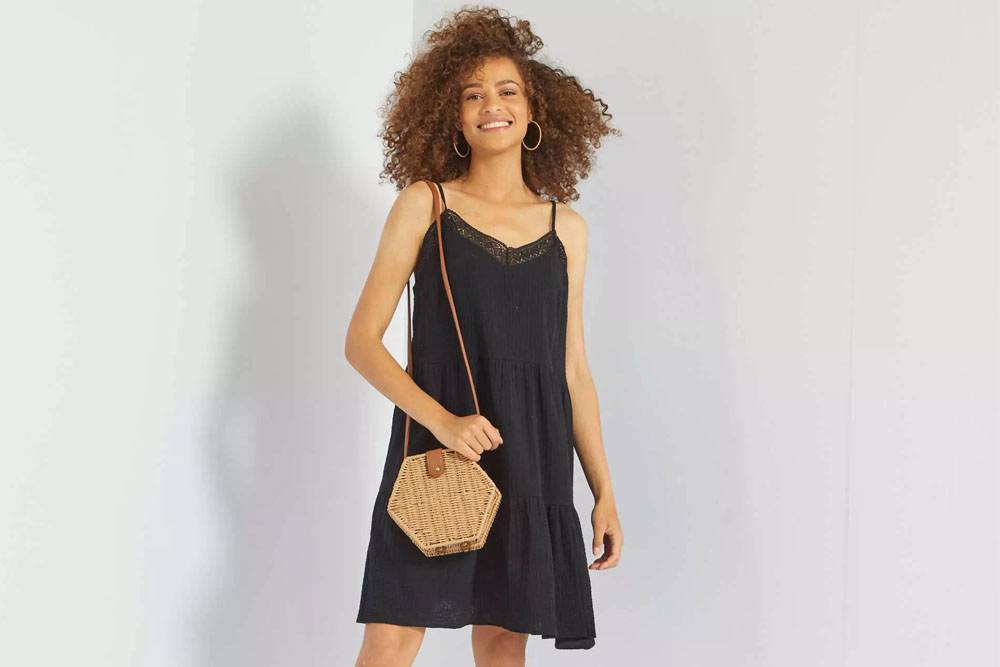
KIABI is a French fashion retailer founded in 1978 in Roncq, France, by Patrick Mulliez. The multinational clothing-retail company creates fast fashion at affordable prices for the whole family.
KIABI makes clothing, accessories, shoes, swimwear, jewelry, and beauty products. It aims to offer creative, affordable fashion for all, for the common good, and for life.
KIABI operates more than 500 stores in 19 countries where it does business. Its goal is to offer the best fashion at the best prices without compromising quality or style.
KIABI has a sustainable and second-hand collection to make a positive impact. It wants to reinvent its business model with more responsibility, sustainability, and circularity.
Panaprium is independent and reader supported. If you buy something through our link, we may earn a commission. If you can, please support us on a monthly basis. It takes less than a minute to set up, and you will be making a big impact every single month. Thank you!
Sustainability Rating: 5/10
Rating FAQ
Category: Clothing, accessories, shoes, bags, jewelry
For: Women, men, children
Type: Basics, denim, knitwear, nightwear, underwear, sportswear, loungewear, swimwear, outerwear, maternity, sandals, flats, boots, sneakers, heels
Style: Casual
Quality: Low
Price: $
Sizes: XS-XL, 2-12 (US), 4-14 (UK), 34-42 (EU), 4-14 (AU), plus size
Fabrics: Cotton, linen, lyocell, modal, viscose, acetate, polyester, nylon, spandex, acrylic, polyethylene, polypropylene, neoprene, polyurethane, rubber, leather, wool, silk, down
100% Organic: No
100% Vegan: No
Ethical & Fair: Yes
Recycling: Yes
Producing countries: Cambodia, China, India, Indonesia, Ethyopia, Morocco, Myanmar, Pakistan, Turkey, Vietnam
Certifications: GOTS, FSC, BCI, BSCI
Sustainability Practices
KIABI is committed to reducing its environmental impact with sustainability objectives like marine conservation, plastic elimination, combat against climate change, and biodiversity preservation.
KIABI also runs a recycling program to collect, donate, resell, or recycle pre-loved clothes and shoes. It provides customers with the opportunity to do good by diverting clothing waste from landfills.
KIABI only uses a small proportion of organic materials such as organic cotton or recycled materials such as recycled cotton, recycled polyester, and regenerated nylon.
Most of its fabrics are either natural without relevant certifications, such as regular cotton or linen, or synthetic petroleum-based fibers such as polyester, nylon, acrylic, and more.
KIABI also uses a small amount of semi-synthetic fibers or regenerated cellulosic fabrics such as Tencel lyocell, modal, acetate, and viscose.
Tencel is an eco-friendly fiber made with wood pulp from certified sustainable forests. But only a tiny proportion of the materials used by KIABI are environmentally friendly and sustainable.
KIABI publishes a list of its manufacturers on its corporate website. It aims to ensure that all the people involved in the supply chain receive good working conditions and safety in factories.
KIABI manufactures its clothes in Turkey and many other East Asian countries where human rights and labor law violations still happen every day.
It doesn't show any labor certification standard that would ensure good working conditions, decent living wages, health, safety, and other human rights for workers in its supply chain.
KIABI has a code of conduct that applies to its suppliers and subcontractors to ensure social and labor standards and ethical and sustainable production.
KIABI assesses compliance with its Code of Conduct by informal visits or third-party audits with or without notice carried out by independent auditing bodies of international standing.
KIABI doesn't use exotic animal skin, hair, fur, or angora. But it uses leather, wool, silk, and down feathers to manufacture many of its clothing pieces.
These animal-derived materials are cruel and unethical. They also harm the environment by producing greenhouse gases and waste. More sustainable alternatives exist.
Sustainability Goals
KIABI has committed to increasing its use of responsible fibers. Its objective is to use 100% sustainable fibers for all its raw materials by 2025.
It also plans to have 50% of its jeans made in a circular manner by 2023. And 30% of its products will be made from recycled fabrics by 2025.
KIABI measures its energy and water usage, greenhouse gas emissions, chemical release, pollution, and waste across its supply chain. However, it doesn't have any clear sustainability goals, science-based targets, or timeline to improve in the future.
Buy Here
Discover KIABI's sustainable collections at Kiabi.com.
Reviews And Experiences With KIABI
Have you had (good) experiences with shopping at or the products of KIABI? Then leave us your rating below.
What We're Up Against
Multinational corporations overproducing cheap products in the poorest countries.
Huge factories with sweatshop-like conditions underpaying workers.
Media conglomerates promoting unethical, unsustainable products.
Bad actors encouraging overconsumption through oblivious behavior.
- - - -
Thankfully, we've got our supporters, including you.
Panaprium is funded by readers like you who want to join us in our mission to make the world entirely sustainable.
If you can, please support us on a monthly basis. It takes less than a minute to set up, and you will be making a big impact every single month. Thank you.

















0 comments